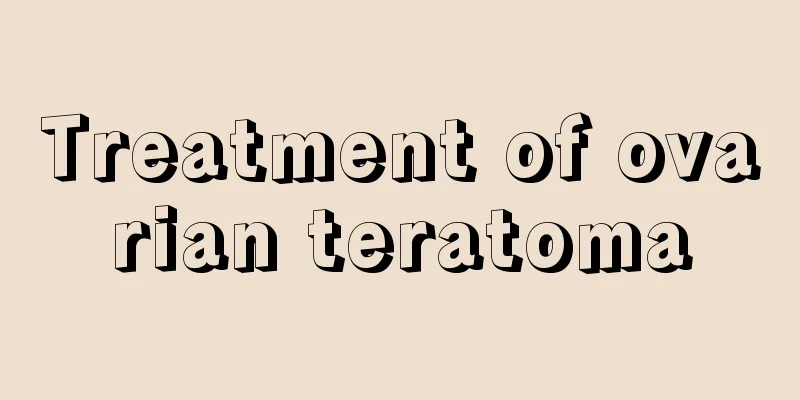Treatment of ovarian teratoma

|
Ovarian teratoma is a tumor that grows in the ovarian tissue and is formed by the abnormal proliferation and aggregation of germ cells. It can be seen in women of any age and is a common gynecological disease. The following is a detailed introduction to the treatment methods of ovarian teratoma, hoping to be helpful to everyone. Common complications of ovarian teratoma: 1. Pedicle torsion; 2. Cyst rupture; 3. Hemolytic anemia; 4. Malignant transformation (malignant transformation rate is less than 5%, and the average age of malignant transformation is about over 50 years old) After the ovarian teratoma is diagnosed, surgery is the best option regardless of its size. For those who want to have children, they can consider pregnancy as long as the normal ovarian function (ovulation and secretion of sex hormones) is restored after surgery. In addition, larger ovarian tumors may affect the egg collection function of the fallopian tube, leading to infertility. It is also possible that the presence of the tumor affects the ovarian function, and there is a risk of early embryonic development arrest after pregnancy. Therefore, it is recommended that patients with teratoma should undergo surgery before pregnancy. There are two surgical methods: laparotomy and laparoscopy. Laparotomy has a large incision and a small field of view, which makes the operation difficult and often makes it difficult to completely remove the teratoma tissue. Laparoscopic surgery has a small incision and a wide field of view with a magnifying effect. The ovary where the teratoma is located is placed in a plastic bag, and the teratoma tissue can be completely removed without contaminating the abdominal cavity. At the same time, it is convenient to explore the contralateral ovary (more than 50% of teratomas are bilateral and occur one after the other). Therefore, laparoscopic surgery is the first choice for ovarian teratoma. Rapid pathological examination is routinely performed during the operation, and the final surgical procedure is determined based on the results. If it is an immature teratoma (malignant) or if complications occur during the operation, laparotomy may be performed. |
<<: Diagnostic criteria for teratoma
>>: Things to note before teratoma treatment
Recommend
Can lung cancer be treated with medicine?
Lung cancer is divided into many types, such as n...
What is the reason for vomiting after eating?
Some people feel like vomiting when eating. No ma...
What are the more obvious symptoms of uterine cancer
Uterine cancer is a type of cancer with a high in...
What to do with herpes zoster intercostal neuralgia
The most common diseases caused by shingles are s...
Can patients with mild cervical cancer do exercise?
Research shows that if women exercise regularly, ...
What are the symptoms of interstitial pneumonia
The development of industry and steel industry in...
What are the oral chemotherapy drugs for brain cancer
Tumors that grow in the skull are generally calle...
What should lung cancer patients pay attention to when exercising? Lung cancer has four ways of spreading
In the early stages of lung cancer, because the s...
What are the harms of drinking to the human body
Nowadays, many young people develop the habit of ...
Why do both sides of my neck swell up when I get angry?
Many people cannot control their emotions, and be...
The benefits of walking on cobblestones
Pebbles are not only smooth and beautiful, but al...
Can bananas and sweet potatoes be eaten together?
Bananas and sweet potatoes are both common foods,...
How to make men more satisfied
In our lives, too many men have too high demands ...
Why can't I use my hands?
I believe that many people have problems with wea...
How to remove something stuck in teeth
We need to eat a variety of things every day, esp...









